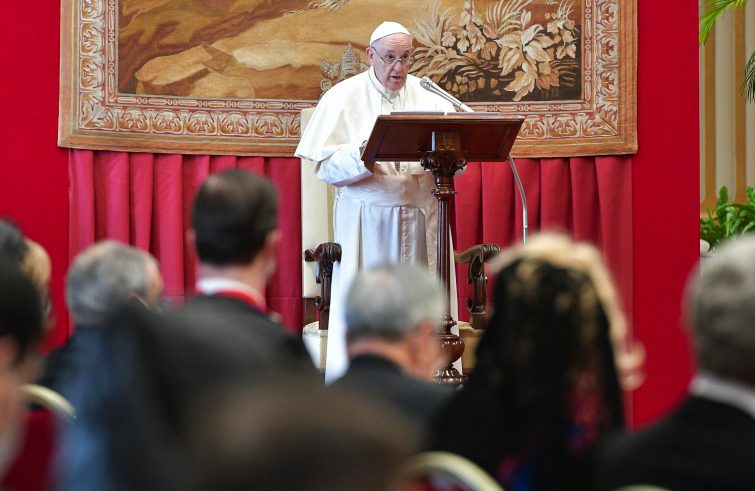
“It is important to continue the effort to immunise the general population as much as possible”, the Pope said in a plea to contrast the Coronavirus, which “continues to cause social isolation and claim lives.” In the traditional New Year’s address to the members of the diplomatic corps, Bergoglio outlined the image of a world still struggling against the pandemic, marked by “strong ideological divides” and by the “dehumanisation” of migrants concentrated in hotspots and endless conflicts.
“Health care is a moral obligation”
Francis said, urging to reject the “ideology of the moment, often bolstered by baseless information or poorly documented facts.” It is necessary to “adopt a sort of reality therapy” that makes us “confront the problem head on and adopt suitable remedies to resolve it.” “Vaccines are not a magical means of healing – Francis underlined – yet surely they represent, in addition to other treatments that need to be developed, the most reasonable solution for the prevention of the disease.” It is necessary “to adopt a policy of generous sharing as a key principle to guarantee everyone access to diagnostic tools, vaccines and drugs.”
Remembering the journey to Cyprus and Greece, Francis recalled the “moving part” of the visit to the island of Lesbos: “Before those faces – Francis said – we cannot be indifferent or hide behind walls and barbed wires under the pretext of defending security or a style of life.”
“No one can be asked to do what is impossible for them, yet there is a clear difference between accepting, albeit in a limited way, and rejecting completely”, is Francis’ guidance with regard to migrations: “There is a need to overcome indifference and to reject the idea that migrants are a problem for others.” In particular, the Pope condemned the
dehumanisation of migrants concentrated in hotspots,
where they end up as easy prey to organized crime and human traffickers, or engage in desperate attempts to escape that at times end in death.”
“Migrants are themselves often turned into a weapon of political blackmail,
becoming a sort of ‘bargaining commodity’ that deprives them of their dignity”, Francis denounced, acknowledging the “spirit of generosity, openness and solidarity” of the Italian people. For the Pope “it is essential that the European Union arrive at internal cohesion in handling migration movements, just as it did in dealing with the effects of the pandemic.” On the international level, Bergoglio denounced the crisis of multilateralism: “Under the guise of defending diversity, it ends up cancelling all sense of identity, with the risk of silencing positions that defend a respectful and balanced understanding of various sensibilities”, the Pope cautioned with regard to the “cancel culture.” Conversely,
“certain enduring values” characterise dialogue and “rise above consensus”, such as “the right to life, from conception to its natural end, and the right to religious freedom.”
“In recent years we have seen a growing collective awareness of the urgent need to care for our common home, which is suffering from the constant and indiscriminate exploitation of its resources”, Francis remarked: “much still remains to be done” to counter the negative effects of climate change, and so 2022 “will be another fundamental year for verifying to what extent and in what ways the decisions taken in Glasgow can and should be further consolidated in view of COP27, planned for Egypt next November.”
The Pope mentioned some of the warring areas of the world, including Syria, Yemen, the conflict between Israel and Palestine, Libya, Ukraine and Myanmar, along with social conflicts on the American continent, where “growing polarization is not helping to resolve the real and pressing problems of its people, especially those who are most poor and vulnerable.”
“Those who possess weapons will eventually use them”,
Francis remarked, reiterating his concern over the use of nuclear weapons and deploring the use of “autonomous weapon systems that can have terrible and unforeseen consequences, and should be subject to the responsibility of the international community.” Education is “the primary vehicle of integral human development, for it makes individuals free and responsible”, continued the Pope, referring to one of the areas of society requiring urgent investment of resources.
“It pains me, then, to acknowledge that in different educational settings – parishes and schools – the abuse of minors has occurred, resulting in serious psychological and spiritual consequences for those who experienced them”, is the Pope’s mea culpa: “These are crimes, and they call for a firm resolve to investigate them fully, examining each case to ascertain responsibility, to ensure justice to the victims and to prevent similar atrocities from taking place in the future.”
“I do appeal urgently that we be watchful lest these instruments substitute for true human relationships at the interpersonal, familial, social and international levels”, the Pope said, calling for an appropriate use of digital tools by the young. Francis devoted his last appeal to labour, “an indispensable factor in building and keeping peace”, which the pandemic has severely impacted, causing a dramatic deterioration of poverty and social inequalities.
“The coming years will be a time of opportunity for developing new services and enterprises, adapting existing ones, increasing access to dignified work and devising new means of ensuring respect for human rights and adequate levels of remuneration and social protection”, is the heartfelt wish of the Holy Father.











